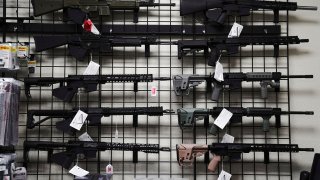
- Amalgamated Bank CEO Priscilla Sims Brown says the reasons major credit card companies have given for not supporting the tracking of gun purchases don't hold up.
- Merchant category codes (MCC) are used for all kinds of purchases by card companies, but not firearms.
Whether you're getting your car repaired, or buying dinner, nearly every business that takes a credit card has a unique merchant code that reports your purchase — except when you buy a firearm.
A merchant category code, typically referred to as MCC, is a four-digit number used by credit card companies to classify different types of businesses and identify the types of goods or services that a company sells. They were first mandated by the Internal Revenue Service in 2004, and currently, the MCC guidelines are maintained by the International Organization for Standardization.
If you have ever been called by your bank, asking you to confirm prior purchases that were detected as potentially fraudulent, that was by way of an MCC. Credit card companies use MCC intelligence and data to find aberrations or patterns in consumer purchases to prevent things ranging from fraud to human trafficking.
Get Connecticut local news, weather forecasts and entertainment stories to your inbox. Sign up for NBC Connecticut newsletters.
Priscilla Sims Brown, president & CEO of Amalgamated Bank, told CNBC's Andrew Ross Sorkin at the Evolve Global Summit on Wednesday that the banking and financial industry can, and should, use these codes to track gun purchases in order to help prevent acts of gun violence.
"While there are merchant codes for the hair salon and the shoe shine place and every other retailer, there's no merchant code for gun stores," said Brown. "If we did have a merchant code for gun stores, we could detect patterns that would indicate that there had been something unusual going on."
Credit card companies could detect any unusual activity, and submit a suspicious activity report with law enforcement, if needed. This type of activity monitoring would prove to be particularly important, Brown said, in detecting when someone purchases large amounts of weapons, or when someone is buying weapons for somebody that is not legally allowed to do so.
Money Report
Software would be able to detect, for example, if someone spent $1,000 at a firearm store, and on the same day, received a $1,000 deposit from someone who is not legally allowed to purchase firearms themselves. In addition, the type of mass purchasing that MCCs would allow banks to detect have proven to be a pattern in the buying history of recent mass shooters in the U.S.
The shooter who killed 59 people at a Las Vegas music festival in 2017, for example, charged over $90,000 on credit cards prior to the shooting. The New York Times reported that the shooter had opened six new credit card accounts over the months prior, and twelve days before the shooting, began an over $26,000 firearm and ammunition buying spree. Before that, his average spending was only a mere $1,500 a month.
If these gun purchases had been tagged with an MCC, Brown said, the credit card companies would have been notified of this alarming pattern.
To date, both Visa and Mastercard are against a firearms merchant code. Brown said of the reasons the credit card companies have provided, "We think every one of those reasons would be something that could be managed."
Card companies have cited concerns related to differences between big box stores that sell many items and more specialized firearms retailers.
Mastercard said in an emailed statement that the issue of gun violence needs to be addressed and it is the responsibility of elected officials to enact meaningful policies, while it remains Mastercard's role to ensure that consumers are permitted to make lawful purchases on our network. Where laws prohibit the sale of certain firearms-related products, it is working to ensure Mastercard products cannot be used to purchase them.
Visa could not be reached immediately for comment.
Amalgamated Bank submitted an application to create an MCC for firearm and ammunition dealers in July 2021, but was denied by the International Standards Organization. CBS obtained documents last month that show employees from domestic and international credit card companies, including Visa, Mastercard and American Express, were a part of the internal committee that recommended the application's rejection.
Brown said Visa and Mastercard's resistance are based on issues for smaller gun stores and larger retailers that can be overcome by having more than one MCC. "You can certainly have more than one merchant code, including one for those that are pure-play gun stores and those that aren't. So there are a number of ways that we could manage this problem if we wanted to."
In fact, this is already common practice. A super-store that has both a grocery and a pharmacy, for example, may have different MCCs for the different products sold within the same business.
Mastercard's statement said its involvement with ISO was limited to providing a perspective that would help the committee understand how the proposed change and potential restrictions on purchasing legal goods might impact merchants and other groups.
This story has been updated to include Mastercard statement.






